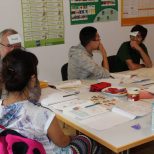- Phone
- Office hours
Mon - Wed : 10:00 a.m. - 04:30 p.m.
- Address
Otto-Suhr-Allee 94, 10585 Berlin
Every single language course in our language school teaches all four language skills – listening, reading, speaking and writing . In this way you can achieve your goal as quickly and successfully as possible. In small groups of up to eight participants, you have the opportunity to take an active part in English, Spanish, Polish or German classes and make great progress in a short time. Our language courses stand for open communication, individual advice and an excellent team that will support you with all questions. You can rely on us!
Thanks to a placement test, we can assess exactly which level is right for you. The placement test for your future language course can be taken either at the school or online.



Our language courses are based on the Common European Framework of Reference for Languages (CEFR) of the Council of Europe , which was introduced worldwide in 2001. The uniform standard enables learners in Europe and around the world a transparent and comparable language acquisition. The language skills of the course participants are assigned to a language level of the CEFR: In this way, you will be qualified for a course corresponding to your language level.
There are three levels of competence: from A1 for beginners to C2 for the highest language level. You can find precise descriptions of competencies on the global scale of the GeR. Please note that each higher level includes the competencies of all lower levels.
Can understand and use familiar, everyday expressions and very simple sentences aimed at meeting specific needs. Can introduce himself and others and ask other people questions about themselves – e.g. B. where they live, what kind of people they know or what kind of things they have – and can give answers to questions of this kind. Can communicate in a simple way if the person you are speaking to speaks slowly and clearly and is willing to help.
Can understand sentences and frequently used expressions that relate to areas of very immediate importance (e.g. information about the person and family, shopping, work, the local area). Can communicate in simple, routine situations that involve a simple and direct exchange of information about familiar and common things. Can use simple means to describe his or her own origin and education, the immediate environment and things related to immediate needs.
Can understand the main points when using clear standard language and when talking about familiar things from work, school, leisure, etc. Can handle most situations encountered while traveling in the language area. Can produce simple connected text on topics that are familiar and areas of personal interest. Can report on experiences and events, describe dreams, hopes and goals and give brief reasons or explanations for plans and views.
Can understand the main content of complex texts on concrete and abstract topics; also understands technical discussions in his own specialty. Can communicate so spontaneously and fluently that a normal conversation with native speakers is possible without great effort on both sides. Can express himself clearly and in detail on a wide range of subjects, explain a point of view on a topical issue, and indicate the advantages and disadvantages of various options.
Can easily understand virtually anything he / she reads or hears. Can summarize information from various written and oral sources, giving reasons and explanations in a coherent presentation. Can express himself spontaneously, very fluently and precisely and also make finer nuances of meaning clear in more complex matters.
If you have any questions, please fill out the form below. We will take care of your request as soon as possible and contact you.
© Copyrights 2021 Nativa Akademie All rights reserved
Design by KB WebStudio